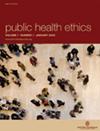将COVID-19视为环境伦理问题:来自非洲关系动物伦理的视角
IF 2
3区 哲学
Q2 ETHICS
引用次数: 0
摘要
在发现2019新型冠状病毒疾病(新冠肺炎)的起源可能是中国武汉的湿货市场后,人类与非人类动物之间的伦理关系这一规范性问题开始引起环保主义者的新兴趣。尽管这些都不是环境哲学中的新问题,但新冠肺炎对世界各地的影响正在挑战人类认真重新考虑其中一些经常被忽视的问题。在这篇文章中,我研究了新冠肺炎本质上是一种环境伦理挑战。具体来说,我认为人类和非人类动物之间的关系在多大程度上可以有效地影响人类的健康和生活以及整个环境。然后,我提供了一些替代方法,让人类重新审视与非人类动物的关系,以避免未来发生像新冠肺炎这样的灾难。我认为,非洲的动物伦理观至少可以提供一个有价值的视角,通过它来看待人类和非人类动物之间的正确关系。最终,我提出并捍卫了一种非洲环境伦理,即人与动物之间的正确关系,并展示了这种伦理如何更好地让人类应对未来的人畜共患疾病。本文章由计算机程序翻译,如有差异,请以英文原文为准。
Approaching COVID-19 as an Environmental Ethical Problem: A Perspective from African Relational Animal Ethics
After the discovery of the origins of the new coronavirus disease 2019 (COVID-19) to be possibly wet markets in Wuhan, China, the normative questions of what ought to be the ethical relations between human beings and non-human animals have started to attract renewed interest among environmentalists. Although these are not new questions in environmental philosophy, the impact of COVID-19 across the world is challenging human beings to seriously reconsider some of these often-neglected questions. In this article, I examine COVID-19 as essentially an environmental ethical challenge. Specifically, I consider the extent to which the relationships between human and non-human animals can effectively impact the health and lives of humanity and the environment at large. I then provide some alternative ways by which human beings ought to re-think their relationships with non-human animals to avoid future catastrophes like COVID-19. I argue that the African view of animal ethics could at least provide a valuable lens through which to view correct relations between human beings and non-human animals. Ultimately, I set forth and defend an African environmental ethic for the right relations between human beings and animals and to show how such an ethic better places humanity in confronting future zoonoses.
求助全文
通过发布文献求助,成功后即可免费获取论文全文。
去求助
来源期刊

Public Health Ethics
PUBLIC, ENVIRONMENTAL & OCCUPATIONAL HEALTH-MEDICAL ETHICS
CiteScore
3.10
自引率
9.50%
发文量
28
审稿时长
>12 weeks
期刊介绍:
Public Health Ethics invites submission of papers on any topic that is relevant for ethical reflection about public health practice and theory. Our aim is to publish readable papers of high scientific quality which will stimulate debate and discussion about ethical issues relating to all aspects of public health. Our main criteria for grading manuscripts include originality and potential impact, quality of philosophical analysis, and relevance to debates in public health ethics and practice. Manuscripts are accepted for publication on the understanding that they have been submitted solely to Public Health Ethics and that they have not been previously published either in whole or in part. Authors may not submit papers that are under consideration for publication elsewhere, and, if an author decides to offer a submitted paper to another journal, the paper must be withdrawn from Public Health Ethics before the new submission is made.
The editorial office will make every effort to deal with submissions to the journal as quickly as possible. All papers will be acknowledged on receipt by email and will receive preliminary editorial review within 2 weeks. Papers of high interest will be sent out for external review. Authors will normally be notified of acceptance, rejection, or need for revision within 8 weeks of submission. Contributors will be provided with electronic access to their proof via email; corrections should be returned within 48 hours.
 求助内容:
求助内容: 应助结果提醒方式:
应助结果提醒方式:


